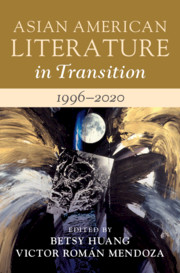Book contents
- Asian American Literature in Transition, 1996–2020
- Asian American Literature in Transition
- Asian American Literature in Transition, 1996–2020
- Copyright page
- Contents
- Illustrations
- Contributors
- Series Preface
- Acknowledgements
- Introduction
- Part I Neoimperialisms, Neoliberalisms, Necropolitics
- Part II Intersections, Intimacies
- Chapter 5 Between the Heteronormative Model Minority and the Homonormative LGBTQ Subject
- Chapter 6 Intimacies and Animacies
- Chapter 7 Trans Feminism, Asian America’s Queer Exception?
- Chapter 8 No Home Away from Home
- Part III Genres, Modalities
- Part IV Movements, Speculations
- Bibliography
- Index
Chapter 6 - Intimacies and Animacies
Queer Ecologies in Asian American Literature
from Part II - Intersections, Intimacies
Published online by Cambridge University Press: 27 May 2021
- Asian American Literature in Transition, 1996–2020
- Asian American Literature in Transition
- Asian American Literature in Transition, 1996–2020
- Copyright page
- Contents
- Illustrations
- Contributors
- Series Preface
- Acknowledgements
- Introduction
- Part I Neoimperialisms, Neoliberalisms, Necropolitics
- Part II Intersections, Intimacies
- Chapter 5 Between the Heteronormative Model Minority and the Homonormative LGBTQ Subject
- Chapter 6 Intimacies and Animacies
- Chapter 7 Trans Feminism, Asian America’s Queer Exception?
- Chapter 8 No Home Away from Home
- Part III Genres, Modalities
- Part IV Movements, Speculations
- Bibliography
- Index
Summary
“Intimacies and Animacies: Queer Ecologies in Asian American Literature” interrogates ideologies that define and govern notions of gender, race, bodies, and nature in Nora Okja Keller’s Comfort Woman and Shani Mootoo’s Cereus Blooms at Night. This chapter explores not only how culturally constructed concepts of filth, decay, and normalcy are mobilized against certain subject positions, but the ways in which these marginalized subjects survive through a radical affiliation and re-orientation to more-than-human natures. Drawing on queer theory’s commitment to destabilizing ideological institutions that structure normative gender and sexual relations, and ecofeminism’s attention to how patriarchal structures overlay the commodification and exploitation of the natural world, this chapter explores the ways these Asian North American authors theorize human-nature relationships in opposition to logics of domination and violence. Suggesting that the fecund, chaotic domicile of Mala Ramchandin in Cereus Blooms at Night offers an articulation of queer space and reading the ingestion of soil, earth, and dust by Comfort Woman’s Kim Soon Hyo as queer incorporation, this chapter examines the oppositional orientations to subjectivity and place that these texts offer.
Keywords
- Type
- Chapter
- Information
- Asian American Literature in Transition, 1996–2020 , pp. 118 - 132Publisher: Cambridge University PressPrint publication year: 2021



